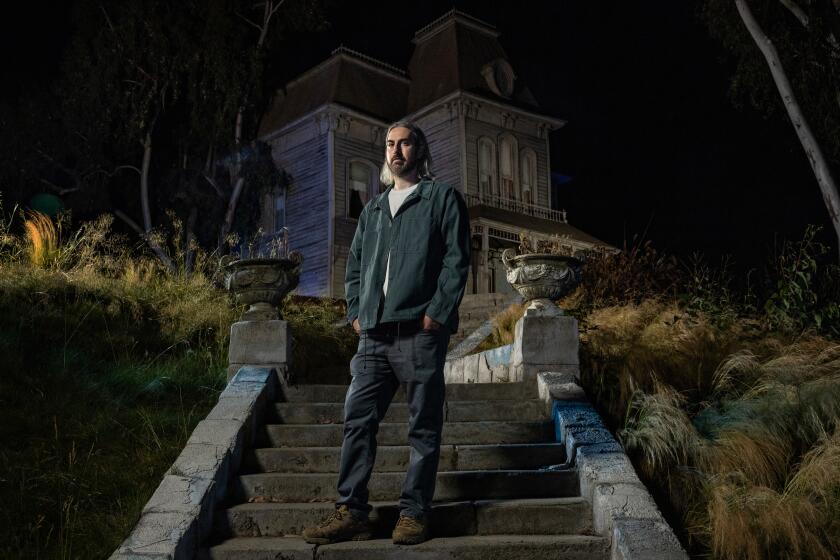Netherlands’ NetHold Emerging as Global Player in Pay TV
When law graduate Koos Bekker returned to his native South Africa after studying for an MBA at New York’s Columbia University in the early 1980s, he went back determined to pass on to his home country his passion for the latest form of electronic entertainment: pay television.
Today, Bekker delivers TV channels, mostly by satellite, to 59 countries in Africa, Europe and the Middle East as chief executive of NetHold, the third-largest pay TV group outside the U.S. after News Corp.’s BSkyB in Britain and France’s Canal Plus. The company, which is based in the Netherlands, has more than 2.8 million subscribers. In Europe, it has 10 pay TV channels.
Bekker’s link with the U.S. may be about to come full circle as NetHold considers a partnership with DirecTV International, which General Motors’ Hughes Electronics recently formed as a sister to the U.S. satellite TV company of the same name. The Times of London first reported the prospects of such an alliance early last month, and DirecTV International could announce as early as today its plans to invest as much as $1 billion in NetHold in return for a stake of about 30%.
With DirecTV’s status as the biggest satellite service in the U.S. and NetHold’s scattered penetration overseas, the two partners might be in the best position to compete globally with News Corp., Rupert Murdoch’s massive satellite TV business.
At the moment, no company is a match for News Corp., whose satellite ventures reach nearly every corner of the world. Its BSkyB in Britain has become a model for imitators and for sister operations in Latin America, Japan, the U.S. and Germany. News Corp.’s StarTV has struggled in Asia but is likely to survive.
As digital technology expands channel choices worldwide, entertainment companies such as News Corp., Time Warner and Viacom are racing to own the services and supply the packages of movies. Though consumers in many countries are unaccustomed to paying for programming, the free offerings are often limited, especially when it comes to U.S. movies.
Meanwhile, Hollywood’s studios are counting on sales to international pay TV operators to help them meet the rising cost of producing movies. A formidable competitor to News Corp. could help drive up the price of programming rights.
NetHold’s roots date back to 1985, when Bekker persuaded investors to set up M-Net in South Africa, reputedly the first pay TV channel in the Southern Hemisphere. M-Net International Holdings obtained a listing on the Johannesburg stock market, and by 1990 it had 500,000 subscribers.
A year later, M-Net joined forces with Richemont, the overseas investment arm of South Africa’s wealthy Rupert family. Richemont owns a stable of luxury brands and tobacco products that include Cartier, Dunhill, Paiget, Montblanc, Rothmans and Peter Stuyvesant, but it was looking for a long-term investment in a growth area to counterbalance its aging brands and the mature cigarette market.
Together, the companies bought FilmNet, a pay TV channel that broadcasts in the Benelux and Nordic countries. By 1993, FilmNet and M-Net had split to form a channel company and a subscriber management company called Multichoice. NetHold was created in 1995 to oversee the entire business; it’s owned 50-50 by Richemont and MIH.
By that time, the original business had expanded through Africa and into the Middle East. In South Africa, the company took advantage of the nation’s passion for sports by offering coverage of big events such as rugby matches. It also grew by careful targeting of smaller countries.
When NetHold launched the first satellite digital TV service in Africa in October 1995, allowing it to provide 25 channels, Bekker told the Financial Times: “There is definitely a market in Africa if we pick our shots carefully. The highest pay television penetration in the world is in Namibia, which is not the likeliest place. There is little else to do in terms of theater or cinema.”
NetHold has followed a similar philosophy in Europe, where it trails BSkyB (40% owned by Murdoch’s News Corp.) and Canal Plus in number of subscribers. Rather than try to enter markets where the battle for viewers is already underway--for example, in Britain, where BSkyB is predominant, and France, where Canal Plus holds a strong position--NetHold has tried to attack countries such as Greece where awareness of pay TV is relatively low.
The company says it has the greatest growth potential of any pay TV company because more than 100 million TV households live in the markets where it is represented. It points to an average subscriber growth rate of 25% for the last seven years. For the year ended in March, it had revenue of $950 million, a 50% rise over the previous year.
Perhaps its greatest success in Europe has been in Italy, where it owns 45% of Telepiu, a locally based pay TV service. Telepiu’s other shareholders are Germany’s Kirch group, which owns 45%, and Finivest, the holding company of former Italian Prime Minister Silvio Berlusconi, which owns the remainder.
“Even though television is big in Italy, viewers didn’t know of satellite television and had little concept of thematic channels such as MTV. So potentially there’s a lot to go for,” NetHold spokesman Jean-Louis Erneux said.
Telepiu has 800,000 subscribers and aims to attract more by offering a “digital bouquet” of both national and international channels covering areas such as music, sports and films (Italian as well as foreign). Telepiu already has the exclusive rights to live Italian soccer games and plans to introduce a pay-per-view service in the next few weeks in which the viewer may be able to choose from 17 different soccer matches each weekend--a huge attraction in soccer-crazed Italy.
NetHold’s technological expertise has allowed it to make the most of digital broadcasting in Europe through video-on-demand, pay-per-view and thematic channels. In May, NetHold signed an agreement with Metro-Goldwyn-Mayer granting it pay-per-view rights to MGM and United Artists films such as “Rob Roy,” “Get Shorty” and “The Birdcage.” It plans to sell the films on a new video-on-demand basis in the Benelux and Nordic countries.
In many ways, NetHold makes a strong fit for DirecTV, which has signed up more than 1.6 million subscribers since its launch in 1994, attracting viewers to its 175 channels through National Football League games and hit movies.
DirecTV has recently begun expanding overseas--in countries that would complement NetHold’s African, Middle Eastern and European bases. It recently launched a 200-channel Spanish and Portuguese service in Latin America, putting it in head-on competition with News Corp. Next year, it plans to launch in Japan.
Along with the neat geographic fit, DirecTV has the financial resources to fund a global attack on pay TV. In January, AT&T; took a 2.5% stake in DirecTV’s U.S. arm--which is autonomous from the international branch--for $137.5 million and is using its sales force to recruit DirecTV customers.
Although Richemont’s core businesses provide it with strong cash flow, insiders say the company is anxious to find a partner to help it meet the high cost of entering new markets and to share the financial risks. It is not alone in its fears as other pay TV companies in Europe scramble to form alliances--for example, the recent partnership between Kirch, BSkyB and DF1 in Germany.
More to Read
The biggest entertainment stories
Get our big stories about Hollywood, film, television, music, arts, culture and more right in your inbox as soon as they publish.
You may occasionally receive promotional content from the Los Angeles Times.






